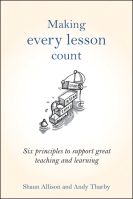 Over the last few weeks members of the SLT visited the lessons of some of our most successful departments. We decided to take a rather different approach to how we usually do things like this. Rather than the usual ‘Department Learning Review’ with formal lesson observations, work scrutinies and judgements, we simply walked around the departments to get a feel for what made them successful. The outcome of the process was different too. All of these departments get fantastic outcomes for students, so there was no need for a judgement – the results speak for themselves. Whatever they are doing, is working – and working well. Instead we simply used it as an opportunity to look for the best practice of these departments and share it across the school – another opportunity to look for the ‘bright spots’.
Over the last few weeks members of the SLT visited the lessons of some of our most successful departments. We decided to take a rather different approach to how we usually do things like this. Rather than the usual ‘Department Learning Review’ with formal lesson observations, work scrutinies and judgements, we simply walked around the departments to get a feel for what made them successful. The outcome of the process was different too. All of these departments get fantastic outcomes for students, so there was no need for a judgement – the results speak for themselves. Whatever they are doing, is working – and working well. Instead we simply used it as an opportunity to look for the best practice of these departments and share it across the school – another opportunity to look for the ‘bright spots’.
To give us a focus, we looked for best practice in these areas of pedagogy:
 There was much to celebrate, as summarised below:
There was much to celebrate, as summarised below:
- It was clear that an important aspect of their success was the high level of challenge from the teacher – this drove the teaching. Students were expected to achieve and work hard and there was no ‘get out’ for students. A key element to this was the teacher using subject specific academic language and expecting students to do the same. The level of the work was challenging, but teachers skilfully supported students to be successful – as described in the following points. When students got ‘stuck’ they were encouraged to show resilience – there was very much a ‘growth mindset’ approach.
- When teachers were explaining new ideas they were very clear and concise – and kept recapping the key learning points. Visual prompts were used to make the learning stick e.g. images, demos etc. The teacher also made the explanations memorable by their own passion for the subject – and wherever possible, ‘told a story’. A really interesting feature was the concept of the teacher ‘opening up the learning gap’ at the start of the lesson – anchoring in to what students already knew, but then making them aware of what they didn’t know – but would by the end of the lesson.
- A key feature was great modelling. Model answers were deconstructed and discussed in detail with a forensic analysis – what made that part so good? Why did they write that? Once this process had been done the teacher and students then constructed answers together – again, explaining each step on the way. This gave students the confidence to work with independence when it came to them applying this new knowledge on their own through deliberate practice.
- Questioning was another strong feature. What stood out here was the probing nature of the questions e.g. can you expand on that? What do you mean by that? Can anyone else develop that answer? When students didn’t know the answer, they didn’t get away with it! So the question may have been rephrased, or someone else asked to contribute, then the original student was returned to. What was clear though was that questioning wasn’t a one off event – it was an ongoing dialogue throughout the lesson – with lots of challenge.
- Lots of quality feedback. Students were keen to show examples of where they had improved their written work using DIRT. Verbal feedback was regular and specific e.g. ‘that’s good because of the way you have…..’ – ‘can you improve that answer by…..’ etc. Students knew what they did well…and why – and what they had to do better….and why. Students were also encouraged to give feedback on other responses, using ABC feedback – Agree, build upon or challenge. This quality feedback made the teaching very responsive i.e. the teachers adjusted the teaching based on how the students were progressing, or getting stuck on. So for example, one whole lesson was based on a style of question that students had perfomrd poorly on in their mocks – so ‘closing the gap’.
The most impressive aspect of the whole process was just the quality of the teaching – no gimmicky, show teaching – just focused, high quality, highly effective teaching. Mr Clarke would have approved…..I think!
We were unable to do a full visit of two of our other great departments – Art & ICT – so they’ll be next. Watch this space!
 The full report can be downloaded and viewed here.
The full report can be downloaded and viewed here.
Many thanks to all of the brilliant teachers, whose lessons we visited. Our students are very luck to have you!











Great to read, Shaun – and I’ve said elsewhere that I’m a great fan of ‘Appreciative Enquiry’ – look at what’s WORKING and learn from that to help raise the bar elsewhere.
A few years into my headship we had a particularly challenging Year 9 group – no particular reason for it, just the group dynamic was such that a lot of staff seemed to be moaning about them, especially re: low level poor behaviour. We were working with a number of individual students but felt we needed to do more, so over a period of about three weeks members of the SLT and the Year 9/lower school pastoral team visited a huge number of Year 9 lessons, just to learn, not to judge. Observers (single observers, and we made sure that we didn’t go into the same lesson) didn’t always stay for the full lesson, and staff (and pupils) knew that during that three week period there was a strong likelihood they might have a visitor at some stage of any lesson. At the end of it all those who had observed got together to pull out a list of all the things we’d seen working well, and in a staff meeting we fed back to all the staff on what we had seen working with this, admittedly challenging, year group. Looking back, we were identifying and disseminating the ‘bright spots’ in order to help everyone.
I think it worked far better than just fixating on ‘the problem’ and what was going wrong.
Thanks for the comment Jill – I think it’s such a sensible approach.
Reblogged this on The Echo Chamber.
I would like this!!!…